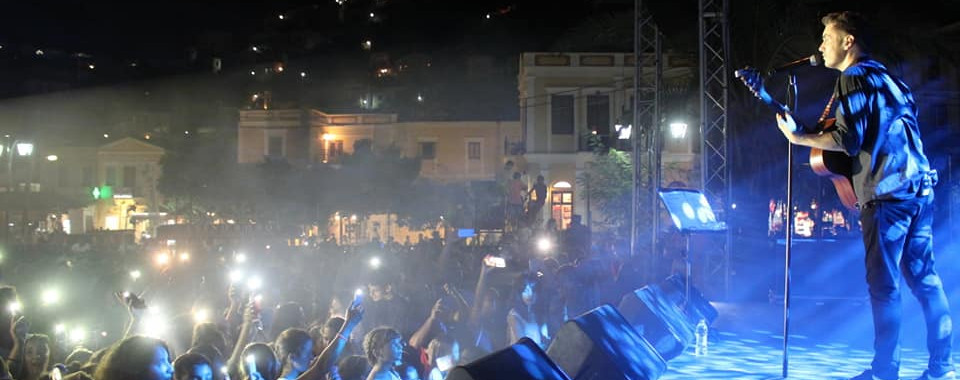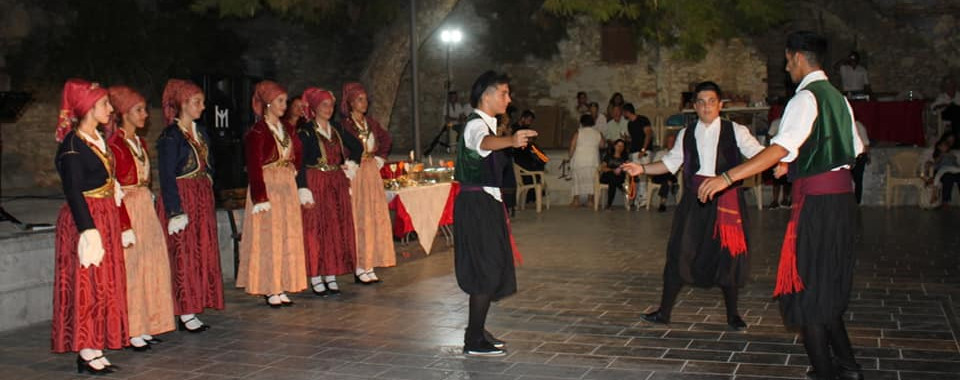Symi by night
- Apr 3, 2021
- 5 min read
When the sun sets, Symi slowly transforms into a cosmopolitan party scene. LOS and MANOS Taverna turn into fancy dance floors. The sound of Greek and disco fills the air, while the thousands of broken dishes vouch for a heated, wild party like no other! Along with the thousands of broken dishes heat the night and turn it into a wild party!
Symi has a great and long history and culture that are spreading from the ancient times to the 21st century. Every single building, church and monastery, alley, tree, boat, even rocks carry a bit of the past with them. The historical and cultural importance is presented in the artistic events and the religious festivities that are taking place every summer in Symi. They are free for anyone to join and you’ll be sure to have the time of your lives next to the lively, cheerful Symians.
Symi Festival
This festival was organized in 1995 for the first time and ever since its success, it is held every summer and attracts visitors from around the world. It could be one of the biggest in the entire Aegean Sea! From July till September various artists from theatrical, film, painting, poetry, literature, musical backgrounds are participating in outstanding performances. The artists are either Greek or foreign and they all collectively create shows that impress even the most challenging viewers! There are other events such as water sports or dancing that are scheduled other months of the year.
Religious festivities
Greeks and especially Symians are pious believers in their patron saints. That faith is what sparks celebrations in the name of divine presences, which you’ll need to experience in person, in order to fully grasp the customs and the identity that locals of Symi have. If you didn’t know, the island has more than 300 monasteries and churches all over it! Many of the saints to which the temples are devoted are commemorated yearly with a huge festival!
Besides the liturgies in churches and monasteries, the citizens hold traditional feasts that serve dishes based on seafood, sweets and pastries and of course, local wines, ouzo etc. Dancing couldn’t be emitted, so you’ll be seeing dances like “Syrtos” and “Koftos” and some local kids and adults being dressed in traditional costumes throughout the night. Definitely, hop on the dance floor and try to figure out the steps, because it’s going to be a memorable moment for you, since Symians know how to live it up!
Chronologically the festivities are on:
24th of May – Holy Trinity in Chorio
24th of June – Agios Ioannis Stafilas
17th of July – St. Marina
20th of July – Prophet Elias
27th of July – Agios Panteleimonas
6th of August – The Great Savior or Transfiguration of Christ
14th -15th of August – Panagia Myrtariotissa and Panagia Alithini (between Pedi and Gialos)/National holiday
23rd of August – Virgin Mary
24th of August – Panagia Ipakoi and Panagia Alithini in Nimos
6th of September – Apostolou Pavlou in Seskli
8th of November and Pentecost – Archangel Michael in Panormitis’ village
Possibly the most known feast days in all of the Dodecanese is the one about the Archangel Michael of Panormitis. It is held annually on the Pentecost and on the 8th of November. He is the patron saint of Symi and protector of the sailors and the spongemen. The monastery at the gulf of Panormitis is, supposedly, there ever since the 15th century and its baroque tower dates from the 18th century. The pebble stone courtyard with the black and white geometric designs resembling fish is a true wonder! The whole building is elegant and ornate on the inside and outside. In the temple and on the right, the full body icon of Archangel Michael in the renaissance style and covered in silver leaves. Thousands of people from all over Greece and the world gather here to pray to him and ask for favors.
After the mass, the pilgrims drink traditional Symian coffee that’s boiled in cauldrons along with fresh milk and then, they head to the dining room of the monastery, where they serve meat broth soup with tomato, barley and beaten egg with lemon. There is also boiled goat, salads with olives, salted fish and semi-sweet Rhodian wine. Across the village and close to the restaurant, you’ll see people selling their products, so you may take something with you, if you’d like. They sell everything from local delicacies to clothes and accessories or even electronic devices. Another big feast day is the one on the 6th of August, the day of the Divine Tranfiguration in the monastery of the Great Savior (Megalos Sotiris). The Liturgies are starting from the night before and end the following day. In the masses even the Metropolitan of Symi is in attendance. Then, around noon, the faithful people get to celebrate in a festive dinner with the main dish being fish, in accordance to the rules of the church. Later, it is customary to do a procession and carry the Icon of the Transfiguration to the homonymous Monastery, Panormitis. The precious, holy icon is received by the Metropolitan and the Evangelist of Panormitis and afterwards, a sequence is performed and the custom of “Panagia” takes place. The people get a piece of bread covered in wine from the High Priest. Lastly, “akoumia” (kind of donuts) and other traditional treats are offered to all.
Some of the dates of the feast days coincide with national holidays in Greece. Pentecost and Agiou Pnevmatos (Holy Spirit) happens fifty days after the Orthodox Easter and is a 3-Day weekend holiday. During this time, most of the shops are closed down and people don’t work, because it’s a celebration of their faith and out of respect, they seize their work-related activities. The islands are mostly full and the ferries traveling on Thursday and Friday start returning on Sunday through Tuesday. So, if you’re planning to travel here during this time, then it’s better if you had booked a room in a hotel in advance.
The other national holiday is that of the Assumption or Dormition of the Holy Virgin (Koimisi tis Theotokou) on the 15th of August. This day is celebrated loudly by thousands of devout people throughout Greece. They pray in temples dedicated to Virgin Mary (Panagia) and ask for help for issues that have to do with health, prosperity and fertility. So, if you’re traveling these dates, do book a hotel beforehand, because in August almost all rooms are booked. Again, most shops are closed for this day.
Whichever feast day you choose to celebrate with the locals, you’re going to enjoy it dearly and you’ll be making lots of wonderful memories from your trip here. Do ask around during your stay to make sure to not miss any celebrations! The locals are welcoming and hospitable and they’ll tell you all about their culture and history and how you can be part of these customs while you’re on the island!























Comments